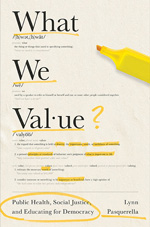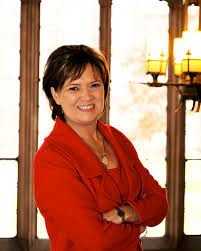Today, we are happy to bring you our conversation with Lynn Pasquerella, author of WHAT WE VALUE: Public Health, Social Justice, and Educating for Democracy, out this week.
*************
What inspired you to write this book?
The book emerged from a series of endowed Phi Beta Kappa lectures delivered at Mercer University on liberal arts and the public life. The nature and immediacy of the ethical, legal, and social issues arising from the COVID-19 virus inspired me to address questions that took on a new sense of urgency as the pandemic unfolded, including how to allocate scarce medical resources, how to balance individual liberty with the public good, and whether it is possible to communicate across differences in a post-truth era.
What did you learn and what are you hoping readers will learn from your book?
I came to understand more fully the ways in which persistent and pervasive racial and economic inequities in the U.S. continue to frame how Americans confront the most fundamental questions of human existence around life and death alongside their attitudes toward one another. I am hoping that readers will gain a new appreciation for the role that liberal education plays in catalyzing both the moral imagination necessary for coming together around shared values and the skills needed to respond to the most pressing challenges of the day.
What surprised you the most in the process of writing your book?
What surprised me the most was the interconnectedness of the ethical challenges emerging from COVID, the ensuing financial crisis, and this moment of racial reckoning. In analyzing each case study, I found myself drawing parallels with other, seemingly disconnected cases, that were appearing daily in the midst of rapidly changing scenarios.
What’s your favorite anecdote from your book?
The anecdote that is most meaningful to me is one that recounts my personal experience with the transformative power of liberal education during an American literature course I signed up for in my first semester at a local community college. One evening my professor arranged for us to see a Hartford performance of “All the Way Home,” a Pulitzer Prize winning play by Tad Mosel. I had never attended a professional production before, and Hartford was a world away–known only to me as the place my father traveled nightly on a third-shift bus to work at Pratt and Whitney. I remember piling into a car with my classmates, dressed in a blue velveteen jumpsuit (it was the 70s after all). And when the lights dimmed, I was transported. In the dark, perhaps especially in the dark, I felt part of something important. Surrounded by classmates, I stared ahead at the stage and waited for what I could not yet see. After the play, our class went for Chinese food and talked. The performance had raised so many big questions about faith, grief, and trust. We discussed the last act when a wife mourns her husband’s unexpected death. “I hope he loved being,” she said, recognizing the possibility he never realized his own strength and potential. What that evening taught me, and why I remember it after all these years, is that we all have a right to experience “being.” We are all entitled to live in our strength. We all deserve opportunities to find our best and most authentic selves.
What’s next?
My work as president of AAC&U will continue to focus on advancing liberal education as essential to the equity mandate before us and to our nation’s historic mission of educating for democracy, especially at a time of increasing polarization and partisanship. A central component will be facilitating narrative change, grounded in truth, racial healing, and transformation in all sectors of society, in order to disrupt the myth of a hierarchy of human value.





